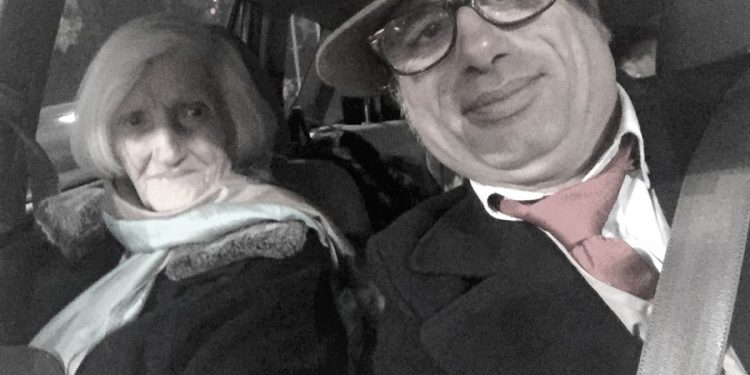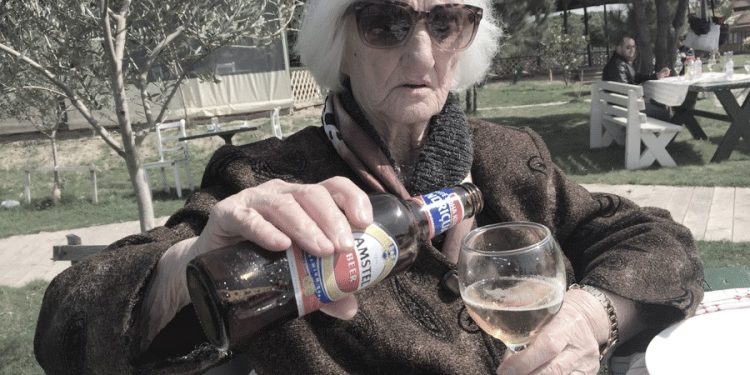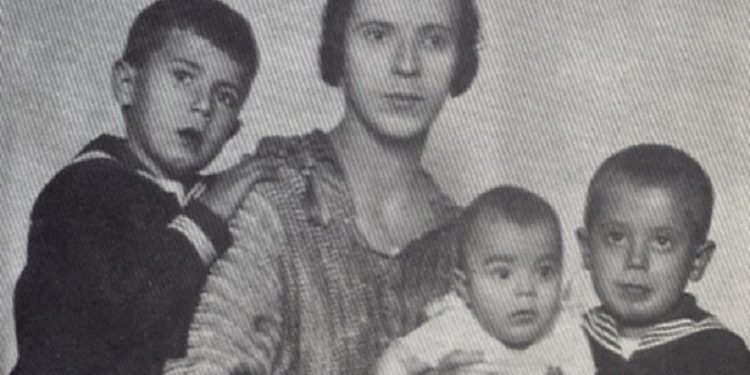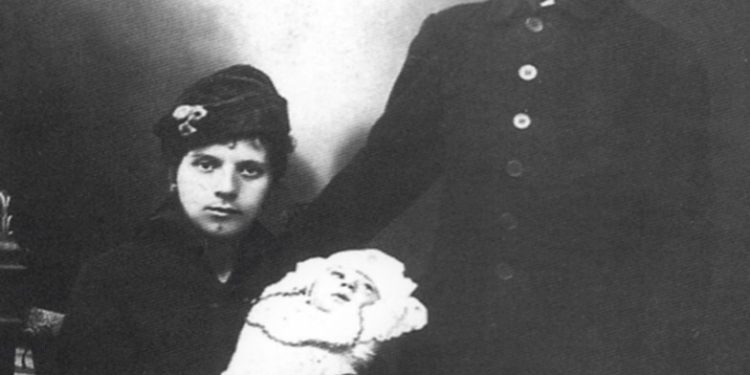By Ani Jaupaj
-The unknown story of the Austrian nanny, who was not allowed to work at Kadare’s house-
Memorie.al / Myzafer Sojli, it had been a few months since she had passed 92 years of life, but this had not affected her memory at all. In addition to being energetic, more than a woman half her age, she could also remember trivial events from the past. Myzafer Sojli is the grandmother of comedian Erand Sojli. They have been living together for more than 25 years. Erandi was the first grandchild in her house and always remained the most beloved.
They woke up together, worked together… because Nona never took her eyes off her grandson. He constantly criticized him for the fact that he shouldn’t work so hard, they read the texts with him, to make the criticisms or evaluations he thought…! Nona is Nona! Due to the evidence that Erandi had at that time with his show, “Romance in 2025”, the meeting with Nona was postponed a little, until we called her son, Xhemal, to leave the meeting.
Myzaferi told us her story, from her return from Istanbul, where she was born, and the times of communism with her husband, Galip, in prison, until the time we met, when you had to be a little lucky to find her in Albania because he traveled to the children, in France and Italy, whenever he wanted. If it weren’t for Erand’s two daughters, her great-granddaughters, from whom she couldn’t be separated, she would travel even more…!
You weren’t born in Albania, were you?
No, I was born in Istanbul. I came here when I was 7 years old, now I have passed 92 years.
How did your father come?
In 1933, the father returned. He had very large wealth. They were a family of bachelors from Dibra e Madhe. The father grew up in Turkey, he also served in the army there, and then he was an officer. Such a large property, inherited for 100 or so years, we hoped it would be returned to us, but it was occupied. When we came, the father was interested, but could not get anything. We came for 3 months, thinking that we would be able to do something, but it didn’t happen like that. My mother left me when I was 5 years old. It was in Istanbul, but I don’t remember.
You didn’t move after that, did you?
We were thinking of running away, but the War started and we stayed here. I went to medical school in Italy, graduated, and then the Movement started. At that time I was only 15 years old when I fell in love with my husband. He was only two years older, 17. We connected a lot, immediately, we participated together everywhere, we went to the partisans together and we were in the First Brigade.
Do you remember those times?
Of course! For me, the most beautiful times of life remain. For us, the war was sacred, we were proud. Then, after the Liberation, the dictatorship, the exiles, life changed completely, things were destroyed. However, we got married and had three children. Now I have eight grandchildren and eight great-grandchildren, I’m expecting the 9th.
You’ve been living with Erand for years, haven’t you? Why with him?
I was with my husband, Erandi went to emigration with his father, but since he was little, he was the closest to me. Sleeping and napping with him was everything to me. I love them all, but he is special. Moreover, in my house, it was the first, although I also had the first child of a girl. Since he was little, Erandi sang and recited, I had bought him a small guitar…! My brother-in-law graduated in Dramaturgy in Rome in 1936 and was at “Cinecittà”. Auntie has finished ballet and Canto, in Rome.
What happened to your husband how is the story?
When my husband was arrested, he was a Secret Service officer in the Ministry of Defense, not in State Security. He often went to Yugoslavia for work services. In one of these services, they discovered him there and tortured he imprisoned him. The state had sent him, but when they caught him, they called him: “treason against the motherland and enemy of the people”. He also made a statement there, after being tortured, against dictatorships. He spent 15 years there as a prisoner.
Meanwhile, you had no contact with him?
After 5-6 years, I receive a letter; I don’t know how he found the opportunity to send it. Meanwhile, the children had grown up a bit, they could understand. I take the letter, read it and sit the children around the table. I told them that a letter had arrived from his father. I was constantly talking to them, so these, even though they had not lived and had not seen him, had grown up with love for him. If we opened it, we risked it. After I opened it, I took it to the Internal Branch, where I was well received because, they had consideration from my past, but I was not penalized even because of the divorce.
So you were divorced by papers from your unaffected spouse?
Yes, officially yes. I filed for divorce. It was the way to save children who were never treated like others because they were not allowed to get an education. So, we didn’t have the same treatment as the enemy. However, I think the hospital work also saved me. I was in emergency, but they called me to find the veins easily in Pavilion 12, which was also the Pavilion of the privileged.
Who came there?
Nexhmije Hoxha’s mother, Fiqirete Shehu, came. I remember Kadri Hazbi’s relatives. Many people came because it was the pavilion just for them.
How is the story of Galip’s arrest? On what charges did they imprison him?
The father was sentenced to death for treason against the country, after the statement he made in Yugoslavia, which was broadcast everywhere. There he was sentenced to 15 years in prison. Once he was released, then he was caught again and imprisoned. Before finishing the prison, he escaped and went to Sweden, with friends and people. There he surrendered. Although convicted, he introduced himself as “Galip Sojli, former officer. I want to return to Albania”!
Although the Consul insisted, telling him that; he should not return, because he was risking his life, he was determined. “I will go to see my wife and children, remove the stain of betrayal and then let me die”! With this motive he came, where he was tried. They sentenced him to 15 years in prison. He has been away from home for 31 years. We cannot say that we were persecuted, but we were oppressed, we were left without a school. However, seeing and hearing people, we say that you were good.
How do you remember his arrival after 30 years?
When he came, I was warned because I thought he would come like all free people and I wanted to go and wait for him. A friend who was a partisan in the Brigade told me: “Don’t go because it’s a trap, don’t be fooled because they don’t bring him home.” Meanwhile, Kadri Hazbiu’s secretary told me: “Go he will come” and I believed him. I dressed the children nicely and we went. As soon as he got off the plane, they put handcuffs on him…!
You didn’t meet him at all?
No, they took it immediately. He didn’t see us because we were inside, but we could see what was happening outside. After 3 months, I took Greta, the mother-in-law, and we went to see her. I had met a friend, Dhori Panarit, and I told him: “For that piece of bread we shared together, let me meet him”! He, although he broke the law, allowed me. There were also good people, not all of them were bad. I also asked for permission for Mamina, that’s how we called the mother-in-law, and we both went.
What did you talk about after all this time?
He was completely disoriented. He only said: “Mom, I’m fine.” He repeated this several times and looked confused. She was strong, a true Austrian. That was almost the meeting. He only tried to calm his mother down. Then, the trial took place, in which I was allowed to participate. The judge told me: “Since you are divorced, leave it like that, when it comes out, get together.” I was stationed there. He needed me: “I can leave him when he comes out, – I told them, – not now.” The decision was made; they sentenced him to 20 years, but reduced it to 15 years, since he returned voluntarily. They left me in court all the time, telling me to listen and decide.
Meanwhile, you continued to live untouched by the system?
Yes. He was in Ballsh, I went back and forth every month. I brought food and stayed one night there. However, the children had taken their lives before Galip returned from Yugoslavia. He came back when the children had been sent to vocational schools, since they would not allow him to go to higher education. For the girl, Fatbardha Prodani, Agim Prodani’s sister, helped me. She was a teacher at the Artistic Lyceum, my friend, and she helped me because, otherwise, no one would take Galip Sojli’s daughter to the Lyceum. The son graduated from the Polytechnic, while the other daughter became a laboratory technician.
Didn’t you meet him?
After prison, did he return home? Yes, home right away. We all lived together.
Did he not find his mother?
No, he had died two years before. She was old, but she went to see him several times.
Did you live with your mother-in-law?
Yes, of course. My Austrian mother-in-law was a liberal woman with great culture. I lived with him until he died in 1980, when I was with three children. She was on a pension, after her husband was killed, she was declared a martyr. I also had my income because, to be honest, despite what happened to my husband, I was not treated badly.
What relationship did the children have with their grandmother?
We lived very close, we were all very close. One of the sons, Xhemali, has the name of his grandfather who was a martyr. He studied in Vienna, where he also fell in love with his grandmother. Xhemal also had the greatest closeness to him.
Did she live alone?
No, he lived with the other son and his wife, because his uncle was also exiled because of his brother, but his marriage with the Italian woman also affected him. However, as I said, we almost all lived together; we had houses next to each other.
I remember that I was in Ballsh with my husband, when I received a telegram about her serious condition. I immediately started that Mamino, as the children called her, or grosmama, died at the age of 83. We have many Greta names at home. Because of her, even the children named the girls. One of them is Erandi, who named one of the girls Greta.
Was Greta bullied in this whole situation?
No, they didn’t touch him either.
It is said that for a while, she was the guardian of Ismail Kadare’s children.
Yes, he started working there for a period of time. They were very pleased, where better to find a cultured person with whom the children could learn the language.
***
GRETA BRUHA SOJLI, THE AUSTRIAIAN WHO LIVED ALONE IN ALBANIA
According to the memories of his wife, Elena, first it happened that the word madam was used at home, instead of friend, who was commonly used at that time, and then their little daughter, Gresa, started stuttering her first words in German. Then, it seems that the Kadare family was in trouble. The period of the “war against liberalization” and the “circulation of cadres” had just begun. Having a nanny could be taken as a sign of bourgeois degeneration, so Mrs. Sojli was forced to return to her home on “Bardhyl” street.
The grandchildren remember her as an authoritative woman who commanded a large family, where brothers, daughters-in-law, sisters, sisters-in-law, children and elders lived together. However, they do not know the details of her life. Their grandfather, Xhemal Sojli, was shot on February 4, 1944. Greta was left almost alone in Tirana, because her son, Galipi, was imprisoned, while the other son was exiled. Greta Bruha is the daughter of Anton and Betty, born in Vienna in February 1897.
In the newspaper “Kuvendi” of May 13, 1919, an article was published about 30 Albanian high school scholarship students, who were returning from Wales, near Linz, to Albania, via Italy, because Austria, defeated in the First World War, could not to keep them on scholarship. Xhemal Sojli was among them. Exactly, at that time Greta must have come to Albania, who then, perhaps to please her husband’s people, became an Albanian citizen, with a typical Muslim name, Jegjane.
After her husband’s murder, Greta’s life focused on her family. “He was always present and decided on everything”, remembers Vladimir Sojli, Mentor’s son. “She was so devoted to her family that it often surprised us. Albanian is spoken at home. Grandma had learned Albanian from an early age. In fact, we didn’t even learn German because of our negligence. Who would have thought at that time, that we would need one day? At that time, we barely kept in touch with my grandmother’s people in Vienna.
Only after the 90s did we connect with them again”. Mrs. Sojli closed her eyes in December 1979, she was escorted to her final residence with a dignified procession, just as people who leave behind a good name deserve. Memoria.al














